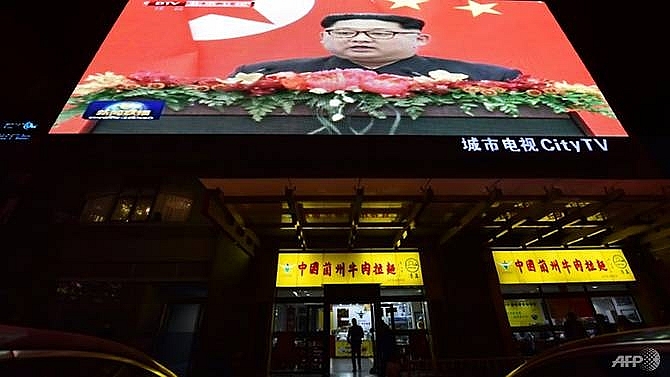UN blacklists dozens of ships, businesses over North Korea smuggling
 |
| News video footage of North Korean leader Kim Jong Un during his meeting with China's President Xi Jinping is seen on a large screen above a restaurant in Beijing. (Photo: AFP/Greg Baker) |
Acting on a request from the United States, it was the largest-ever package of sanctions designations on North Korea approved by a council committee, diplomats said.
The move is part of a global crackdown on the smuggling of North Korean commodities in violation of UN sanctions resolutions, which were adopted in response to Pyongyang's nuclear and ballistic missile tests.
The sanctions were approved as the United States moves to open talks with North Korea on its nuclear drive, with a summit possible between President Donald Trump and Kim Jong Un by the end of May.
Despite the diplomatic opening, the United States has made clear they will keep the pressure on Pyongyang to shift course by pressing on with sanctions.
Trump's ambassador to the United Nations, Nikki Haley, on Friday welcomed the "historic" sanctions package," calling it "a clear sign that the international community is united in our efforts to keep up maximum pressure on the North Korean regime."
"We want to thank the members of the Security Council, as well as Japan and South Korea, for working with us to keep up the pressure and for their commitment to implementing UN Security Council resolutions and holding violators accountable," Haley added.
A total of 13 North Korean oil tankers and cargo vessels were banned from ports worldwide along with 12 other ships for helping Pyongyang smuggle banned commodities or supplying oil and fuel shipments, according to a UN document obtained by AFP.
Two other North Korean vessels were hit with a global assets freeze, but are not banned from port entry.
Twenty-one shipping and trading firms were hit by an assets freeze. Three of them are based in Hong Kong including Huaxin Shipping, which delivered shipments of North Korean coal to Vietnam in October.
NORTH KOREA FLOUTS SANCTIONS
Twelve North Korean firms were blacklisted for running ships involved in illegal transfers of oil and fuel, according to the document.
Two other companies - Shanghai Dongfeng Shipping and Weihai World Shipping Freight, also based in China - were blacklisted for carrying North Korean coal on their vessels.
The remaining firms are in based Singapore, Samoa, the Marshall Islands and Panama.
A businessman identified as Tsang Yung Yuan was hit by a global travel ban and assets freeze for organizing illegal shipments of North Korean coal with a North Korean broker in Russia.
Last year, the Security Council adopted a series of resolutions to ban North Korean exports of commodities in a bid to cut off revenue to the nuclear-armed state's military programs.
The measures severely restrict deliveries of oil and refined petroleum products to North Korea, but sanctions monitors have reported that Pyongyang has used vessels to dodge those restrictions.
North Korea earned US$200 million in revenue last year from exports of coal, iron, steel and other banned commodities, according to a recent report.
Only eight North Korean vessels had so far been banned from ports for sanctions-busting - so the inclusion of 13 other ships on Friday was expected to significantly cripple North Korea's maritime network.
The United States had initially asked the United Nations to ban 33 ships and 27 firms over smuggling, but China put a hold on that request to review the list.
Earlier this month, the White House said Trump and Chinese leader Xi Jinping agreed in a phone conversation to keep up the sanctions pressure on North Korea until Pyongyang takes concrete steps toward denuclearisation.
What the stars mean:
★ Poor ★ ★ Promising ★★★ Good ★★★★ Very good ★★★★★ Exceptional
Related Contents
Latest News
More News
- 72 nations sign landmark Hanoi cybercrime convention (October 26, 2025 | 18:00)
- UN Secretary-General commends Vietnam’s global leadership (October 26, 2025 | 09:00)
- APEC finance ministers convene to tackle regional challenges (October 22, 2025 | 17:31)
- Rewiring global trade: ASEAN’s rise as supply chain hub (October 17, 2025 | 11:40)
- Vietnam attends first World Nuclear Week Forum in Russia (September 26, 2025 | 10:50)
- Vietnam attends 69th session of IAEA General Conference (September 16, 2025 | 10:00)
- ADB, WB pledge over 12 billion USD for ASEAN power grid, renewable energy projects (August 15, 2025 | 14:18)
- Lowy Institute proposes AI-based tobacco control solutions for ASEAN (August 15, 2025 | 14:14)
- Cloud computing policy to position Malaysia as regional hub by 2030 (August 15, 2025 | 14:11)
- Thailand, Cambodia suffer numerous cyber attacks (August 05, 2025 | 16:19)

 Tag:
Tag:






















 Mobile Version
Mobile Version